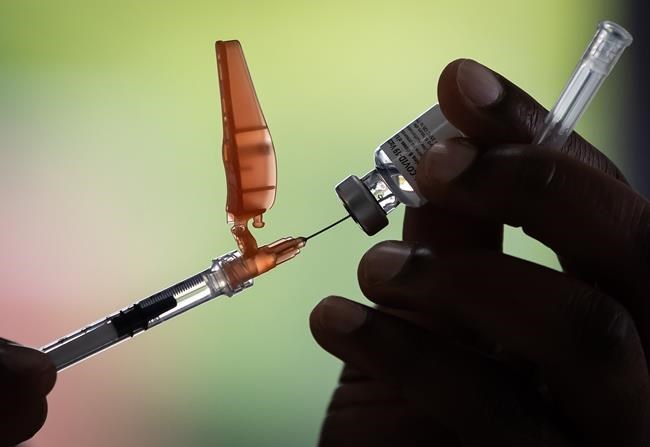OTTAWA — The final two vaccines on Canada's purchase list reported positive results from Phase 2 trials this week, including the only vaccine Canada pre-purchased that is being developed domestically.
Quebec-based Medicago reported Tuesday that two doses of its plant-based virus-like particle vaccine generated 10 times the level of antibodies in healthy adults and seniors than are seen in patients who have recovered from COVID-19.
A day earlier, French pharmaceutical giant Sanofi Pasteur reported its second attempt at a COVID-19 vaccine had produced antibodies on par with those found in recovered COVID-19 patients. The antibody response was higher in people between 18 and 59, the company said.
Sanofi, which like Medicago is finishing its vaccine with a pandemic adjuvant from Britain's GlaxoSmithKline, went back to the drawing board last December after tests on its first vaccine had disappointing immune results in older adults.
Neither study is peer-reviewed yet.
Nathalie Landry, the executive vice-president for scientific and medical affairs for Medicago, said other vaccines in use showed a direct correlation between the level of antibodies produced and their effectiveness against COVID-19.
"So based on these results, let's say we're quietly confident that we will be in a position to demonstrate good efficacy of the vaccine," she said.
To do that in a way that meets Health Canada's rules, both Medicago and Sanofi have to complete a double-blind, event-driven Phase 3 trial.
Medicago is already working on one, recruiting up to 30,000 volunteers in as many as 11 countries. Sanofi is launching their third trial with up to 35,000 people in the coming week.
About half get the vaccine, the other half get a placebo, and then everyone waits to see how many from each group get COVID-19, and how serious those infections become.
It's the same kind of trial used to determine that Pfizer-BioNTech, Moderna and Oxford-AstraZeneca were effective but they were all tested mostly when there were no authorized vaccines on the market and recruiting volunteers wasn't hard.
"In countries like ours, where a vaccine is becoming fairly easily available to all adults, there's no question that it makes it more difficult," said Dr. Michael Libman, an infectious disease specialist at McGill University who is directing the Phase 3 study at the university.
"Almost everybody can now get an appointment for the next short while. So it's now, you know, no longer obvious to people why they should join."
Libman said there is a provision in the trial that those who didn't get vaccinated will be given the vaccine eventually, about 60 days or longer after they join the trial.
Landry said she's hopeful the Phase 3 trial will enroll enough people and get results this summer but there is no firm timeline.
Medicago and Sanofi are two of the seven vaccines Canada signed purchase agreements for last year. Canada has a deal to buy 20 million doses of Medicago and 52 million of Sanofi, with options for millions more of both.
But by the time either vaccine is even ready for authorization, the vast majority of Canadians will be fully vaccinated, with Pfizer, Moderna or AstraZeneca.
Landry said Medicago is in discussions with Ottawa about how the vaccine can still be of use, including as potential booster shots, for mixing-and-matching as second doses, or donations to countries who still need vaccines.
While both vaccines are arriving on the scene late, there is still a monumental task ahead to vaccinate the entire world, and most expect years of booster shots are going to be required as well.
Medicago and Sanofi will likely be the first two vaccines to have any part of production take place within Canada.
Though the bulk material for Medicago is being made in North Carolina, and Sanofi is producing its bulk material in the United States and Europe, both vaccines will be filled and finished with the GSK pandemic adjuvant in Canada.
A new Medicago plant in Quebec that could make most of the bulk material in Canada should be ready in 2023, said Landry.
Novavax, the only other vaccine on Canada's purchase list that hasn't yet been approved, is to start producing about two million doses a month by the end of the year at a new National Research Council facility in Montreal.
Innovation Minister Francois-Philippe Champagne announced another $199 million vaccine production investment to Resilience Biotechnologies in Mississauga, Ont., Tuesday. The investment is about half the funds going to build new capacity to produce mRNA vaccines in Canada.
This country has no domestic mRNA production currently and all of its Pfizer and Moderna doses are coming from the U.S. and Europe.
This report by The Canadian Press was first published May 18, 2021.
Mia Rabson, The Canadian Press



